IEEE Transactions on Communications
-
Joint Design of Channel and Network Coding for Star Networks
Connected by Binary Symmetric Channels
Koller, Christian ; Haenggi, Martin ; Kliewer, Jorg ;
Costello, Daniel J.
IEEE Transactions On Mobile Computing
- Bounds on the Benefit of Network Coding for Wireless Multicast and Unicast
Keshavarz-Haddad, A. ; Riedi, R.H.
IEEE Transactions On Multimedia
-
Random Network Coding for Multimedia Delivery Services in
LTE/LTE-Advanced
Vukobratovic, D. ; Khirallah, C. ; Stankovic, V. ; Thompson, J.S.
Source: IEEE Comunications Society’s Publications Contents Digest

